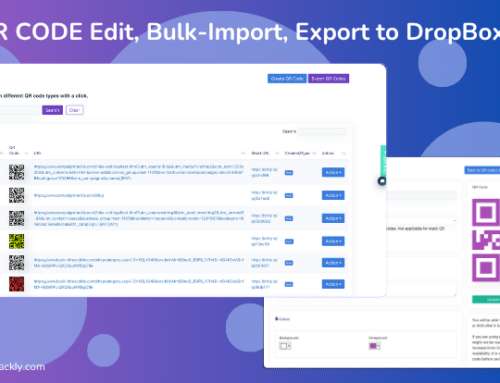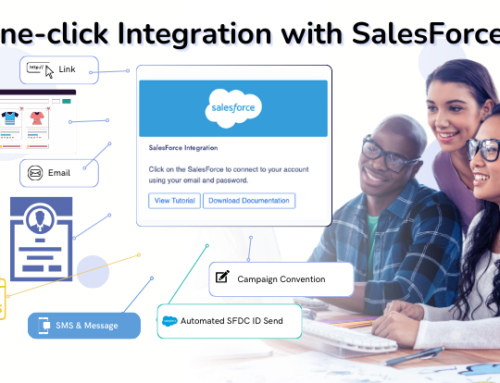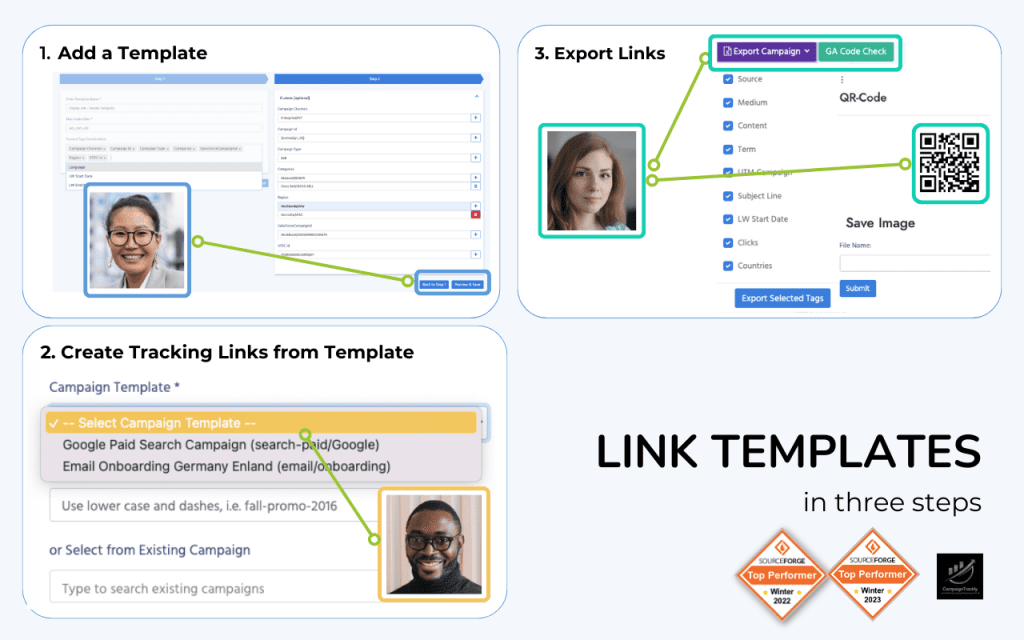By Andy Redan
With billions of users across various platforms, social media presents a wealth of opportunities
for businesses to connect with their audience and drive conversions. However, simply having a
presence on social media is not enough to achieve succes.
Businesses must develop effective social media marketing strategies tailored to their unique
goals and audiences to stand out in a sea of competitors and make a lasting impression.
Social Media Evolves Constantly
Fortunately, social media marketing is a constantly evolving field, with new trends and tactics
emerging all the time. From influencer marketing to video content, organizations have a range of
tools at their disposal to help them build their brand and engage with their audience.
And once they understand the market, they can further enhance their knowledge by reading
articles like this Complete Guide to Monitoring Your Competitors.
Below, we explore some of the best practices businesses can use to optimize their social media
presence and achieve their marketing goals. Whether you’re new to social media marketing or
looking to take your existing strategy to the next level, this article will provide you with valuable
insights and actionable tips to help you succeed in today’s competitive digital landscape.
Let’s dive right into it!
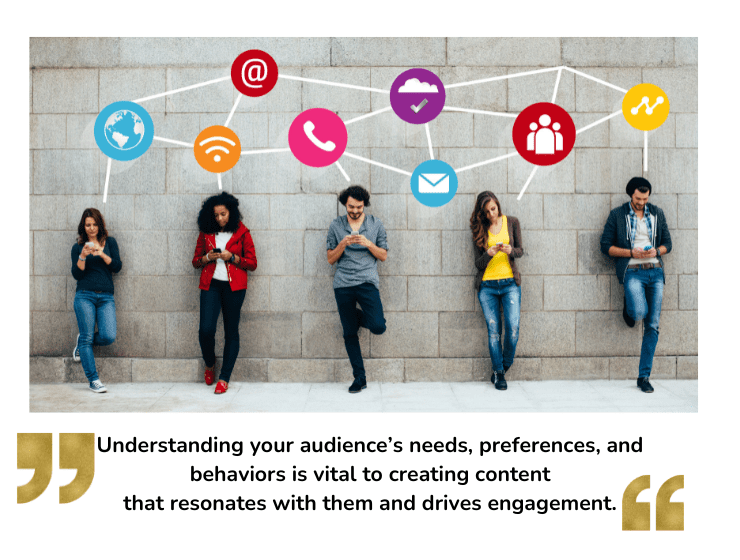
Identify Your Target Audience
Understanding your audience’s needs, preferences, and behaviors is vital to creating content
that resonates with them and drives engagement.
Start by analyzing your existing customer base and looking for common characteristics like age,
gender, location, interests, and buying behavior. You can also use social media analytics tools
to gather insights into your followers’ demographics, engagement rates, and interests.
Yates Jarvis, founder of 2 Visions, an E-commerce marketing consultancy, recommends: “Once you’ve identified your target audience, tailor your content and messaging to meet their
expectations, preferences and needs using tools like e-mail API and delivery services and build a personalized engagement strategy that will maximize your customer lifetime value (LTV).
Choose the Right Social Media Platforms
Not all social media platforms are created equal, and different platforms may be better suited to
your business depending on your target audience and marketing goals.
For instance, if your target audience is primarily professionals, LinkedIn may be a better
platform to focus on than Instagram. Similarly, if you’re looking to showcase visual content, such
as photos or videos of your products, Instagram or Pinterest may be a better fit than Twitter.
When choosing social media platforms to focus on, consider your audience’s demographics,
interests, and behavior, as well as the platform’s features and functionalities. Thanks to it, you
can choose the platforms that are most likely to reach your target audience, paving the way to
achieving your marketing goals.
Create High-Quality Content
Creating high-quality, engaging content is key to building a successful social media presence.
Your content should provide value to your audience and should align with your brand’s value
and messaging.
To create high-quality content, focus on the following:
- Use high-quality visuals. Whether it’s photos, videos, or graphics, visuals are a crucial
part of social media content. Use high-quality, visually appealing pictures aligned with
your brand’s aesthetic. - Use engaging copy. Your copy should be concise, informative, and engaging. Use a
conversational tone that resonates with your audience and include calls-to-action (CTAs)
to drive engagement. - If you’re using AI tools to generate social captions or blog snippets, it’s essential to humanize AI content so it aligns with your brand’s voice and feels natural to your audience. A few edits can make the difference between robotic text and copy that builds trust and connection.
- Be consistent. Consistency is critical to building a strong social media presence.
Develop a content calendar and stick to a regular posting schedule to keep your
audience engaged and informed.
Engage With Your Audience
Engaging with your audience is crucial to building a successful social media presence. To do
so, you should respond to comments and messages promptly and use social media listening
tools to monitor conversations about your brand.
By engaging with your audience, you can build stronger relationships with your customers,
increase brand loyalty, and gather valuable feedback and insights that can inform your
marketing strategy.
Measure and Analyze Your Results
Measuring and analyzing your social media performance is crucial to understanding what’s
working and what’s not, and making data-driven decisions to improve your strategy.
It will help you create a more personalized experience for your current and potential clients and
increase the chances of driving engagement and conversions.
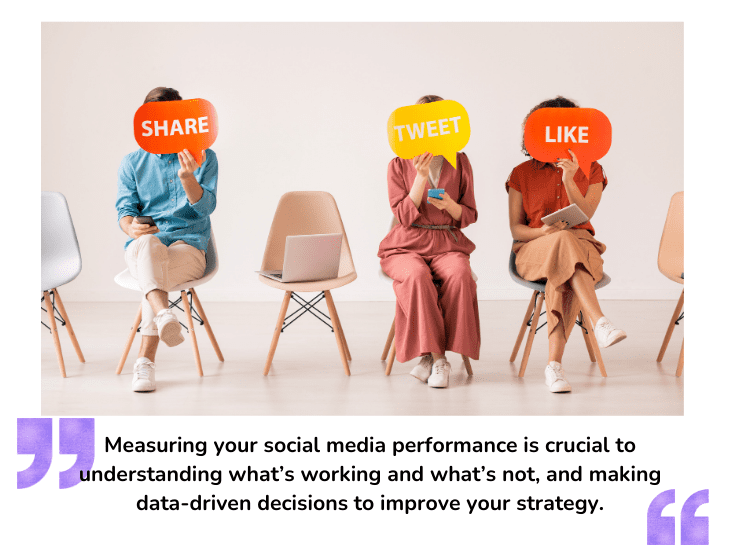
Here are a few critical metrics to track:
- Engagement, which includes likes, comments, shares, and other interactions with your
content. High levels of engagement indicate your audience is interested in your brand
and finds your content valuable, while low levels of engagement may suggest you need
to adjust your content or targeting. - Reach, which refers to the number of people who have seen your content. By monitoring
your reach, you can determine your targeting’s effectiveness and whether you’re
reaching your intended audience. - Conversions indicate whether your social media efforts translate into tangible results,
like website visits, leads, or sales. By tracking conversions, you can identify which social
media platforms and campaigns drive the most results and allocate your resources
accordingly.
Craft an Unbeatable Campaign Tagging & Tracking Process In 5 Simple Steps
See how easy it is to build a consistent, error-free reporting process
It’s important to use a range of tools and techniques to measure your results and gather
customer feedback, including social media analytics platforms, website analytics tools, and
surveys.
If you combine quantitative and qualitative data, you can gain a more comprehensive
understanding of the impact of your social media marketing efforts and make data-driven
decisions about future campaigns.
Final Thoughts
Social media marketing is an essential tool for businesses to build their brand, engage their
audience, and achieve their marketing goals. Using the strategies mentioned above, companies
can optimize their social media presence and drive engagement and conversions.
That being said, it’s critical to remember that social media marketing is not a one-size-fits-all
solution. Organizations should tailor their approach based on their unique needs and goals.They should keep up with the ever-evolving social media landscape and adapt their strategy
accordingly.
With the right approach and mindset, every company can harness the power of social media to
build its brand and achieve lasting success. By providing value to your audience, fostering
engagement, and tracking your results, you can take your social media marketing to the next
level and achieve your business goals.
This article is a guest blog written by:
Andy Redan



